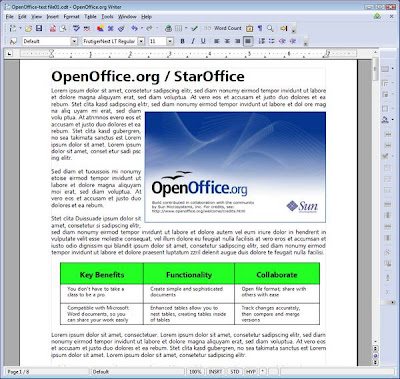 |
| Microsoft word market-share battle between 1986 - 1997 |
1. Despite Microsoft behavior the leading position create a monopoly with positive consumption externalities for word processor market due to the large number of users that are now familiar with the dominant design. Initially based on the graphic concept of what-you-see-is-what-you-get, the user interface for word processor achieved a high level of maturity and the basic layout adopted widely.
 |
| OpenOffice Writer layout |
2. Although the market is changing: New Office office suite, stand-alone application, open sources solutions and web base apps are others alternatives to Microsoft word processor. Users have a wide range of solutions and they can choose which suits best to their needs. Compare them here.
3. Still the battle for dominance enter in a new field: File format. After the International Organization for Standardization approved the Open Document Format (that was designed to permit files compatibility between different applications), Microsoft introduce its own file format (docx). Although this is also an XML based format which means that is open and licensed free. OpenOffice and some web based application such as Google docs adopted the Odf file format.
4. Microsoft Word is very competitive with a strong position in the market. Although market forces are changing and new trends are emerging. For example:
- Consumers are becoming more independent from installed application since they are doing everything online: creating, sharing and storing their files online;
- Online application are reliable, available and easily convertible to any format (pdf, xml, doc, etc);
- And definitely with word processor one size does not fit all. From the school student to the most diverse professional, business and government institutions there are a lot of needs to be fulfilled.
Articles source:
http://www.utdallas.edu/~liebowit/book/wordprocessor/word.html
http://www.businessweek.com/magazine/content/06_27/b3991412.htm
http://lowendmac.com/musings/08mm/rise-of-microsoft-monopoly.html

